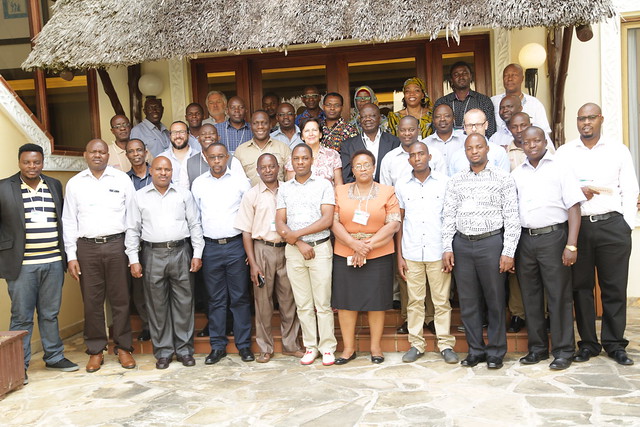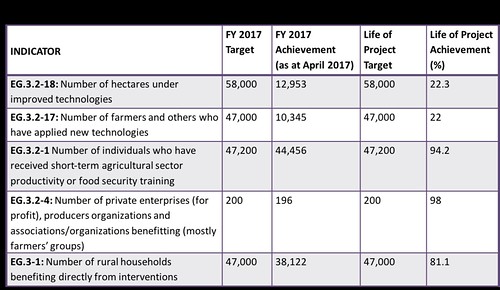Africa RISING–NAFAKA project legacy under the lens in end-of-phase one review

In September 2014, the United States Agency for International Development (USAID) Tanzania Country Mission unveiled a project unlike any they had initiated before—a partnership project bringing together two consortia with capacity and technical nous for agricultural research on one hand, and development on the other. The kind of partnership project that would effectively ensure that life-changing improved agricultural technologies from the research process would get into the hands of, and be used by, smallholder farmers.
Through this move, the Tanzania Staples Value Chain Project, also know as Africa RISING–NAFAKA, was born. It joined up the work of two equal partner USAID-funded programs that were working in the country leading to a convergence of vision and complementarity of skills to reach the following targets:
- Ensure at least 47,000 smallholder farm households in rural Tanzania were enabled to access technologies to diversify and increase their food supply and income sources, and to improve the quality of degrading smallholder cropland;
- Expand the area under improved crop production technologies by at least 58,000 ha; and
- Increase yields of both maize and rice by 50% as a result of the technologies being applied.
On 3-4 July 2017 in Dar es Salaam, Tanzania, the partners who are implementing the project came together to review achievements made during a largely successful run of the project’s initial three-year phase. They reported on the milestones made by the project such as the introduction of improved crop varieties, better agricultural practices, natural resource management, reduction of food wastage and spoilage, and community capacity building.
An important project, a unique model
‘This project pioneered a first-of-its-kind technology delivery model in Tanzania and we now have a clear path for turning research outputs into development outcomes,’ said Victor Manyong, the International Institute for Tropical Agriculture (IITA) director for the Eastern Africa Hub, at opening of the meeting. ‘We are very interested in the lessons form this project because they give us an indicator of how organizations like IITA will need to carry out research in the future,” he added.
The Africa RISING–NAFAKA project model has become a case study within USAID on how future partnership projects funded by the agency may look like. Speaking at the opening, USAID Tanzania’s research and production advisor, Elizabeth Maeda, said that despite some ups and downs during implementation, there was a lot of perseverance by partners in the project who each gave the results and information needed to defend and explain the projects work. ‘Africa RISING–NAFAKA is lauded within USAID as a great example of how a collaboration should work between an international research institute and a local partner project to create lasting impact on farmers’ lives,’ she added.
Numerous achievements and lessons learnt
At the top of most partners’ lists of key achievements by the project was the good working relationship and understanding between implementing partners. ‘We have remained committed to common goals during the past three years of the project and there is virtually no competition between partners for attribution or visibility,’ said Thomas Carr, the NAFAKA project chief of party. ‘Our third year 2016/2017 is for me the best of our collaboration because the relationships got better. And I believe this will continue into the second phase of this project.’
Through a gallery tour and a series of presentations, partners also highlighted the key achievements in the maize (and legume), rice, and vegetable value chains as well as aflatoxin mitigation and post-harvest management.Some of the key results highlighted were:
- Successful introduction of drought-tolerant and resilient crop varieties (maize, rice, legumes and vegetables) to over 40,000 farming households in Tanzania.
- Promoting good agricultural practices among at least 40,000 households thereby contributing to sustainable intensification of agro-ecosystems.
- Working with at least four national agro-input companies to ensure that the improved crop varieties and associated agro inputs are available to farming households.
- Working with Tanzania Official Seed Certification Institute (TOSCI) and 10 district councils to promote the quality declared seed system for rice and legumes, reaching over 200 producers.
- Introducing labour-saving technologies and aflatoxin management techniques in the maize/legume farming system of seven districts thereby contributing to improving the quality of agricultural produce for enhanced market access and nutrition.
- Strengthening the capacities of over 150 government agricultural extension staff and village-based agricultural advisors (VBAAs) so that they can sustain project achievements going into the future.
- Use of geographic information systems (GIS) to better target project interventions to suitable agro-ecosystems.

Partners also took time to tease out the lessons learnt so far from the project’s implementation. The following emerged.
- Initiating and maintaining partnerships with the private sector is critical for sustainability and wider adoption of technologies. For example, the post-harvest team established partnerships with a private company called A-to-Z Textile Mills for the supply of PICS storage bags to a larger number of farmers.
- On some of the topics like creation of awareness about Aflasafe, engaging with members of the civil society added immense value to the awareness creation efforts.
- For all project activities at the local level, involving the local institutions like the District Agriculture, Irrigation and Livestock Cooperatives Offices (DAICOs), village heads etc. was critical for success and helped address questions about sustainability.
- Incorporating cooking shows and preparation of different recipes as part and parcel of activities to promote elite vegetable varieties enhanced the success achieved in technology dissemination by the vegetables team.
- As part of a broader exit strategy, the rice team linked-up with agro-dealers to make sure that the seeds and other inputs are available to farmers in the future.
- Using the VBAAs and champion farmers can be challenging but is one of the effective methods of technology dissemination.
- The vegetables team trained farmers to produce their own seeds as a step toward sustainability. However, to further enhance sustainability, they team plan to attract more seed companies.
- Some partners created WhatsApp groups which resulted in much closer interaction on any technical issues arising.
- Use of the modular approach to train farmers helped the vegetables team to provide a more holistic training to farmers.
Support from USAID
In a message delivered on behalf of the project management team, Africa RISING manager for East/Southern Africa and West Africa projects, Irmgard Hoeschle-Zeledon thanked USAID for staying steadfast in supporting the project despite ongoing changes at the agency and competing priorities for funding.
‘For a long time, we in Africa RISING tried to work with NAFAKA in areas of common interest but this never took off until USAID provided additional funds. Technology dissemination is costly and needs particular technical expertise. These resources allowed IITA to get this extra-expertise to support the excellent work that NAFAKA has been doing so far. So, Africa RISING is grateful to USAID for providing us with resources to develop products/technologies and then to also ensure they get scaled up and farmers can access them,’ said Irmgard.
A planning meeting is scheduled for August 2017 where partners will develop activity work plans as the project shifts gears into a new implementation phase.
Read all the review meeting notes
See pictures from the meeting




